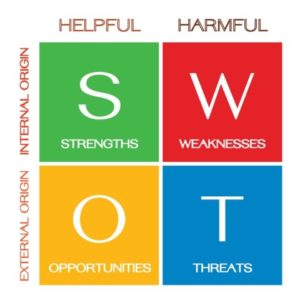The news for international education is getting worse by the hour. Italy is under quarantine and now Israel is putting folks in quarantine for 14 days when they enter the country. The US has a President spouting out misinformation about the coronavirus. Many colleges and universities are cancelling programs through the summer. The Governor of New York State is distributing hand sanitizer made by the industrial prison complex (and that in itself is a post for another day!).
And as one friend said “When SxSW cancels, the world as we know it is over.” She was being facetious of course, but things are definitely feeling like they’re unraveling these days.
With every life experience that derails life or business plans, we must muster up courage to take a breath (perhaps a bad use of words in this case?) and remind ourselves that with every difficulty comes opportunity. The coronavirus has reminded me to consider the SWOT analysis which is often used in business settings.
S: Strength
W: Weakness
O: Opportunity
T: Threat
So let’s take a moment to SWOT the coronavirus situation in international education. (As I don’t work at a university or provider, I’m going to be more general than you should be when you SWOT.)
When we list out what is swirling around us in international education with the unknowns of the coronavirus, we can imagine the negatives – Weaknesses/Threats most easily.
For example:
Weaknesses:
- Not having the appropriate travel insurance for individuals or faculty led groups.
- Uncertainty about how to handle a global issue of this scale when it comes to students who are stranded, being quarantined, etc.
- Weak or non-existent crisis management infrastructure in place.
- Being daily administrators of key educational exchange programs, yet not being included in decision making during a crisis or having no authority to influence decisions being made.
and
Threats:
- Financial losses for unexpected additional consulting, refunds, etc.
- Disillusioned students who may hesitate to sign up for study abroad again.
- Global partners who may fear working with us going forward due to the withdrawals occurring.
- Fear of closure of international education exchange departments and/or staff layoffs.
Well that doesn’t sound good, does it?
In this midst of this crisis, I observe a lot of talk about what a disaster this situation is and how upset everyone is feeling. I’m also hearing how disrespected many international education administrators feel about their lack of participation in the decision making.
On top of that, the crisis is being expanded by the media’s varying reports and what some consider extreme responses (e.g. Italy) to the situation.
But what about the opportunities? Are there any? Can we muster up the courage, under horrific circumstances, to explore opportunities that feel genuine, appropriate, and perhaps even healing?
Let’s use the SWOT analysis to examine some of the opportunities and strengths in international education, recognizing that some weaknesses and threats also double as opportunities and strengths.
For example:
Strengths:
- Our educational programs are filled with employees who are deeply committed to the work of international education.
- We have a professional association, NAFSA, that is providing guidance through this crisis.
- Teams often become more solid and steadfast when they are experiencing a crisis.
Opportunities:
- We have students who have returned home unexpectedly and are prime candidates for urgent and respectful re-entry program, an area that is often a weakness in education abroad. This creates an opportunity to focus (or re-focus) on re-entry, including the support of mental health professionals (not only for our students and faculty, but for administrators too).
- We have students eager to go abroad who may not be able to right now or in the near future, creating an opportunity to thoughtfully consider the design of our next pre-departure programming and orientations, including expanded focus on cultural awareness and competency (often another area of weakness for some programs).
- We have students who are potentially being placed on lock down in the US or abroad, or required to work from home under certain circumstances, allowing us to expand our virtual programming and to be creative in teaching approaches, including the employ of deep compassion.
- We have staff who are working virtually, unexpectedly, who have an opportunity to learn new skills around virtual teams and communication. (This is a very useful article by Ashley Munday, Director of Cultural and Organizational Transformation at SweetRush, offering tips on Preparing Your Team to Work from Home.)
Do any of these resonate with you? Feel familiar? Appropriate? Premature? Something else?
A SWOT analysis is an appropriate and necessary document at a time of crisis and I would encourage you to explore, with your team and senior administration, how the SWOT exercise can re-focus your organization and its varying teams. It helps you to create new goals and objectives with appropriate tactics.
Will it be easy? Probably not, but neither is coordinating epic academic experiences abroad or soothing international students stuck in the US while borders close and quarantines expand.
With that said, Melibee Global has explored the situation in our own little shop and has gleaned the following from the SWOT exercise:
- We will have flexible plans for any speakers booked in person for talks on campuses or companies including rescheduling or pivoting to virtual presentations as needed.
- Offering a new International Education Career Academy for those who have unexpected downtime (or are perhaps are even more busy!) and don’t want to put their international education career pathing on hold for one more minute. This program will launch on March 20th – so if you’d like to be included in the email with more details then, please click here.
- We will be offering some online workshops to help teams prepare for two possibilities – attending global conferences (on one end of the spectrum) and/or working effectively in virtual teams. We’ll be doing so with Jennifer Hamady, a nationally recognized psychologist and voice expert. More information will be available in the coming weeks on that. Meanwhile, you can learn more about Jennifer’s incredible background here.
Those are our initial plans to support the international education global community during this crisis, while also looking to the strengths and opportunities in this field during a crisis.
I’d love to hear what you’re doing during this global crisis to look forward and plan strategically while also dealing with the known realities. Basically, what’s your SWOT look like?
PS – I wrote a variation of this on social media last week as my own way to honor international educators around the world during this crisis:
 AN INTERNATIONAL EDUCATION LOVE STORY:
AN INTERNATIONAL EDUCATION LOVE STORY:
International educators:
I SEE YOU.
I see you working through the coronavirus for your study abroad students and your international students.
I see you reading up on germs, hand washing, reading about whether masks work, how much Vitamin C is preventative.
I see you talking with parents and students, often in more than one language.
I see you coordinating faculty for discussions.
I see you wiping away the burning tears of those who may not be able to go or have had to come home.
I see you meeting with your teams and partners across the world to figure out the right path.
I see you talking emails at midnight and at 3 AM.
I see you trying to take care of yourself (usually last) and giving what you can, despite it all, to take care of your families/children.
I see the stress on your face.
I see you eating lunch at your desk and sometimes dinner and breakfast too.
I see you.
I applaud you for your commitment. Your dedication.
Your love story to culture.
You are seen.

